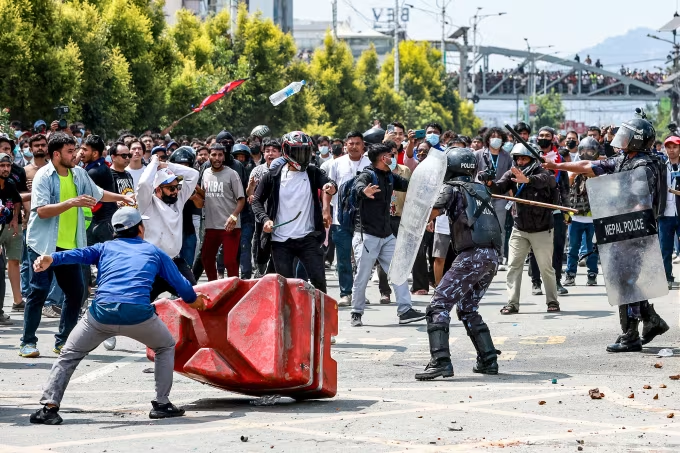Police in Kathmandu, Nepal, opened fire on demonstrators protesting the government’s ban on social media, killing at least 17 people and injuring 145, officials reported on Monday.
The death toll was confirmed by police official Shekhar Khanal, who also said that 28 police officers were among the wounded as smaller protests continued into late Monday evening.
Rallies erupted around the parliament building, where tens of thousands of Nepalis expressed anger over authorities’ decision to block major social media platforms, including Facebook, X, and YouTube.
Government officials said these companies had failed to register locally and submit to oversight.
Protesters broke through barbed wire, forcing riot police to retreat inside the parliament complex. Police ultimately opened fire on the demonstrators.
The situation remained tense, prompting the government to impose a curfew on Monday around the parliament, the government secretariat, the presidential house, and key areas of the city.
Seven of those killed, along with scores of the wounded, were admitted to the National Trauma Center, Nepal’s main hospital in central Kathmandu.
“Many of them are in serious condition and appear to have been shot in the head and chest,” said Dr. Badri Risal. Families anxiously awaited news of their loved ones, while residents lined up to donate blood.
“Stop the ban on social media, stop corruption not social media,” chanted crowds outside the parliament, waving Nepal’s red and blue national flags.
Monday’s demonstration was dubbed the “protest of Gen Z,” referring to people born between 1995 and 2010.
The government said that about two dozen social platforms widely used in Nepal had repeatedly been asked to register officially.
Those that failed to comply have been blocked since last week.
Platforms including TikTok, Viber, and three others have registered and continue to operate without interruption.
The authorities’ move follows the submission of a bill to parliament that seeks to ensure social platforms are “properly managed, responsible and accountable,” including appointing a liaison office in the country.
However, the bill has faced heavy criticism as a potential tool for censorship and a way to target government opponents online.
Rights groups have condemned it as an attempt to restrict freedom of expression and violate fundamental rights.
Nepal previously banned TikTok in 2023, citing disruptions to “social harmony, goodwill and diffusing indecent materials.”
The ban was lifted last year after TikTok executives pledged compliance with local laws, which also include the country’s 2018 ban on pornographic sites.
